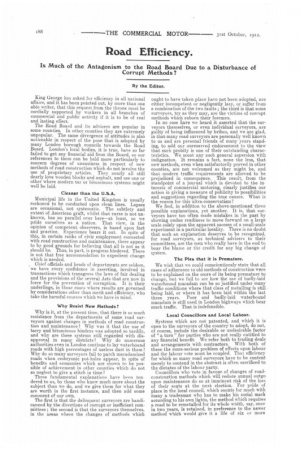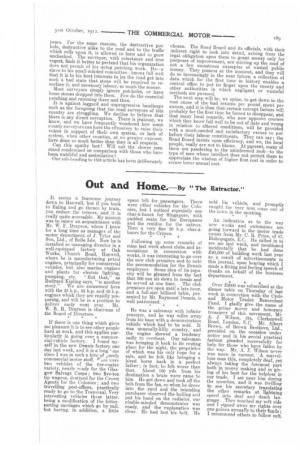Road Efficiency.
Page 12

Page 13

If you've noticed an error in this article please click here to report it so we can fix it.
Is Much of the Antagonism to the Road Board Due to a Disturbance of Corrupt Methods ?
By the Editor.
King George has asked for efficiency in all national affairs, and it has been pointed out, by more than one able writer, that this request from the throne must be cordially supported by workers in all branches of commercial and public activity if it is to be of real and lasting effect.
The Road Board and its advisers are popular in some counties. In other counties they are extremely unpopular. The same divergence of attitudes is also noticeable in respect of the pose that is adopted by many London borough councils towards the Road Board. London's local bodies, it is true, have so far failed to get any financial aid from the Board, so our references to them can be held more particularly to concern degrees of uneasiness in respect of new methods of road construction which do not involve the use of proprietary articles. They nearly all still dearly love wooden blocks and asphalt, and use one or other where modern tar or bituminous systems might well be laid.
Cleaner than the U.S.A.
Municipal life in the United Kingdom is usually reckoned to be conducted upon clean lines. Lapses are occasional, not systematic. The subtlety and extent of American graft, whilst that curse is not unknown, has no parallel over here—at least, so we pride ourselves as a nation. That view, in the opinion of competent observers, is based upon fact and practice. Experience bears it out. In spite of this, in certain ranks of civic employment connected with road construction and maintenance, there appear to be good grounds for believing that all is not as it should be. Thus, in part, is progress hindered. There is not that free accommodation to expedient. change which is needed.
Chief officials and heads of departments are seldom, we have every confidence in asserting, involved in transactions which transgress the laws of fair dealing and the provisions of the several Acts that are now in force for the prevention of corruption. It is their underlings, in those cases where results are governed by considerations other than merit and efficiency, who take the harmful courses which we have in mind.
Why Resist New Methods?
Why is it, at the present time, that there is so much resistance from the departments of some road surveyors against changes in methods of road construction and maintenance ? Why was it that the use of tarry and bituminous binders was adopted so tardily, and why are these systems still regarded with disapproval in many districts? Why do numerous authorities even in London continue to lay waterbound roads with high percentages of useless dust in them ? Why do so many surveyors fail to patch macadamized roads when embryonic pot-holes appear, in spite of benefits and economies which are shown to be Possible of achievement in other counties which do not so neglect to give a stitch in time ?
Three fundamental explanations have been tendered to us, by those who know much more about the subject than we do, and we give them for what they are worth in the first instance, and then add some comment of our own.
The first. is that the delinquent surveyors are handicanoed by the directions of corrupt or inefficient committees ; the second is that the surveyors themselves, in the areas where the changes of methods which ought to have taken place have not been adopted, are either incompetent or negligently lazy, or suffer from a combination of the two faults; the third is that some surveyors, try as they may, are the victims of corrupt methods which suborn their foremen.
In no case have we heard it asserted that the surveyors themselves, or even individual surveyors, are guilty of being influenced by bribes, and we are glad, in that many road surveyors are personally well known to us and are personal friends a many years standing, to add our unreserved endorsement to the view that such probity is one of their outstanding characteristics. We scout any such general aspersion with indignation. It remains a fact, none the less, that new methods, even when satisfactorily proved in other counties, are not welcomed as they might be, and that modern traffic requirements are allowed to be prejudiced in consequence. This result, from the standpoint of a journal which is devoted to the interests of commercial motoring, clearly justifies our action in giving a measure of publicity to possibilities and suggestions regarding the true causes. What is the reason for this ultra-conservatism?
We fmd, in addition to the above-mentioned three possible explanations, yet another. It is, that surveyors have too often made mistakes in the past by showing undue readiness to move forward on a large scale solely upon. the apparent success of a small-scale experiment in a particular locality. There is no doubt that such an explanation deserves to be recognized, for road surveyors, as technical advisers to their committees, are the men who really have in the end to bear the blame or the credit for any big change of system.
The Plea that it is Premature.
We wish that we could conscientiously state that all cases of adherence to old methods of construction were to be explained on the score of its being premature to change, hut we fail to see how the use of badly-laid waterbound macadam can be so justified under many traffic conditions where that class of metalling is still being laid, or where it has been laid within the last three years. Poor and badly-laid waterbound macadam is still used in London highways which bear much traffic. That is indefensible.
Local Councillors and Local Labour.
Systems which are not patented, and which it is open to the surveyors of the country to adopt, do not, of course, include the desirable or undesirable factor of "a turn" for narties who are not really entitled to any financial. benefit. We refer both to trading deals and arrangements with contractors. With both of these the more-serious problem of effects upon labour and the labour vote must be coupled. That efficiency for which so many road surveyors have to be content merely to contend in the abstract is often sacrificed to the dictates of the labour party. Councillors who vote in favour, of changes of roadconstruction methods which will reduce annual outgo upon maintenance do so at imminent risk of the lose of their seats at the next election. For pride of place in the local council, which counts for much with many a tradesman who has to make his social mark according to his own lights, the method which requires a road to be remetalled for its whole width, say, once in two years, is retained, in preference to the newer method which would give it a life of six or more
years. For the same reasons, the destructive pothole, destructive alike to the road and to the traffic which rolls upon it, is allowed to form and to grow unchecked. The surveyor, with reluctance and true regret, finds it better to pretend that his organization does not permit of his doing patching work. Re—a slave to his small-minded committee--knows full well that it is to his best interests to let the road get into such a bad state that stone will be required to resurface it, and necessary labour, so much the sooner. Most surveyors simply ignore pot-holes, or have loose stones dropped into them. Few do the essential patching and ramming there and then.
It is against laggard and unprogressive handicaps such as the foregoing that the road surveyors of this country are struggling. We decline to believe that there is any direct corruption. There is jealousy, we know, and we have frequently wondered how some county surveyors can have the effrontery to raise their voices in support of their own system, or lack of system, when other counties, at no greater expense, have done so much better than they in all respects. Can this apathy last? Will not the slower men stand condemned on comparison with those who have been watchful and assimilative ?
Our sub-heading to this article has been deliberately chosen. The Road Board and its officials, with their indirect right to look into detail, arising from the legal obligation upon them to grant money only for purposes of improvement, are stirring up the mud of not a few monstrous examples ot wasted public money. They possess at the moment, and they will do so increasingly in the near future, a collection of data which for the first time in history enables a central office to put its finger upon the county and other authorities in which negligent or wasteful methods are pursued.
The next. step will be, we opine, to get down to the root cause of the bad returns per pound spent per annum, and it is then that certain corrupt factors will probably for the first time be forced to disappear, and that many local councils, who now approve courses which they know full well to be out of date and wrong in relation to altered conditions, will be provided with a much-needed and satisfactory excuse to put before their labour constituents. They can say: the Road Board insists upon efficiency, and we, the local people, really are not to blame. At psesent, many of them are pandering to the uninformed mob—to the type of men whose intellect does not permit them to appreciate the wisdom of higher first cost in order to secure lower annual cost.




















